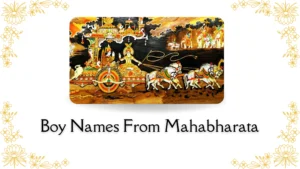Choosing a name for a child is more than a simple task; it is a weighty responsibility. The name we give carries with it hopes, dreams, and the essence of who they might become. In Hindu tradition, names are sacred, steeped in meaning, and rich with history. Each syllable has a purpose, each sound has a resonance that can guide a life.
I remember the feeling of standing at the crossroads of choice, considering the legacy behind every option. A name can shape a child’s identity and influence their path in ways we can’t always foresee. It’s not just a label; it’s a story waiting to unfold.
Thoughtful naming honours our culture and our ancestors. It gives our children a compass, something to navigate by as they journey through life. In this moment, we must choose wisely.
“May we be given good names, auspicious names, so that our names might bring us glory.”
Rigveda 10.85.24
What is the Significance of a Name in Hinduism
When you choose a name, you’re not simply deciding what others will call your child; you’re alluding to how they’ll connect with the world. A name becomes a bridge between generations, a reflection of culture, and sometimes even a compass that quietly guides their journey through life. This choice, while exciting, carries the weight of setting a foundation for your child’s identity.

Cultural Significance
In Bharat names carry the essence of a family’s heritage, reminding the child where they belong. They can reflect not just the child’s roots, but the beliefs and customs that have shaped the family for generations.
Choosing a name from religious texts or cultural legends allows parents to embed their child’s identity within a larger narrative. It’s a way of keeping traditions alive, ensuring that stories from the Ramayana or Mahabharata resonate in the present, forming a silent but steady link between the past and the future.
Personal Meaning
Some names are chosen not for their history but for the meaning parents hope to manifest in their child’s life. They might embody qualities like courage, compassion, or wisdom—virtues that parents deeply cherish. These choices transform the name into a lifelong aspiration, a quiet reminder of the dreams parents have for their child’s future.
At other times, a name can carry emotional weight, honouring the memory of a beloved ancestor or symbolizing gratitude for a meaningful event in the family’s life. The right name becomes a talisman, gently reminding the child of the love, intention, and hopes that formed its essence.
Impact on Identity
Every time a child introduces themselves or hears their name spoken aloud, it reinforces how they fit into the world. A name can boost confidence, foster pride, and serve as a subtle reminder of belonging. Conversely, it can also shape how others perceive and treat the child.
A meaningful name offers a sense of rootedness—an anchor in a world that often feels unpredictable. Over time, children grow into their names, making them an integral part of their personal and social identity. Names, in this way, become stories they tell about themselves, shaping both their inner sense of self and how the world reflects that identity to them.
What Factors to Consider When Choosing a Name
1. Cultural and Religious Considerations
In Hindu tradition, names aren’t chosen lightly—they hold spiritual and cultural importance. Parents often look to sacred texts or astrological charts for guidance, aligning the name with the child’s birth star, or Nakshatra.
The names of gods, goddesses, or mythological figures serve not only as inspiration but as blessings woven into the child’s life. Whether it’s Krishna, Parvati, or Arjuna, these names connect the child with divine qualities that many hope will shape their character. It’s a profound way to introduce the child to both faith and culture from the very beginning.
2. Meaning and Significance
A name should carry depth, not just sound beautiful. In many families, choosing a name with a positive meaning is paramount. Words hold power, and the meaning behind a name becomes part of the child’s story.
For example, a name like Dhruv—which signifies the North Star—evokes steadfastness and reliability. Similarly, Ananya, meaning unparalleled, gives a sense of uniqueness and individuality. Parents can think of this as planting a seed: just as the meaning of a name takes root in the child’s life, it nurtures the qualities the family hopes will flourish as they grow.
3. Pronunciation and Spelling
The most meaningful name can lose its charm if it’s constantly mispronounced or misspelt. In a multicultural world, parents should consider how the name sounds not only within their community but also beyond it.
A name like Shreya might flow easily for some but prove tricky for others. That’s where thoughtful spelling can help—choosing versions that are easy to say without altering the essence of the name. Additionally, children shouldn’t have to correct their names every time they introduce themselves. A name that feels natural to say builds confidence, ensuring the child wears it comfortably throughout their life.
4. Initials and Nicknames
Names inevitably evolve, often taking on forms parents didn’t expect. While a beautiful name might stand out, it’s worth thinking ahead about what initials or nicknames might arise. A name like Devansh might turn into Dev or Devy in everyday use. Sometimes, a nickname adds charm, becoming a term of affection unique to family and close friends.
On the other hand, initials that form unfortunate acronyms—like Vikram Om Patel—can cause unintended humour. While you can’t control everything, being mindful of how the name might evolve helps avoid potential pitfalls while embracing charming variations.
5. Family Traditions
Family customs often play a significant role in the naming process. Some families follow the tradition of naming children after grandparents or great-grandparents, believing this keeps the spirit of the ancestor alive. In other cases, certain letters or sounds may be favoured across generations.
Parents may also choose names based on family rituals or traditions that honour deities worshipped in the household. Involving extended family in the process can strengthen emotional bonds, making the chosen name feel like a shared gift.
However, modern parents often find themselves balancing these traditions with their desire for originality, ensuring the name feels both meaningful and unique to their child.
The Process of Choosing a Name
Naming a child is no small feat. It’s not just about picking something that sounds nice—it’s a delicate art that requires imagination, patience, and perhaps just a hint of wizardry. Let me walk you through how I approached it, much like crafting the perfect spell.
Brainstorming and Research
You don’t just pluck a name from thin air—though how marvellous that would be! It begins with inspiration. Start by delving into your family’s heritage—there’s something profoundly magical about honouring ancestors. You might find a gem hidden in your great-grandfather’s name or uncover a forgotten tradition from your roots that could spark the perfect idea.
And let’s not stop there! If history excites you, look to the great figures of the past. A name inspired by a king, poet, or freedom fighter carries not only beauty but a legacy. Perhaps a name from nature will call to you—Aranya (forest) or Tara (star). Nature is timeless, after all, and it holds meaning for every generation.
Once your imagination runs wild, it’s time to reign it in with some practical tools. Name books and online platforms (like Naamkosh!) can spark ideas you’d never have thought of. But beware—you might find yourself lost in lists, overwhelmed by choices. That’s perfectly fine! Let the brainstorming flow like ink on parchment; there will be time to narrow things down later.
Narrowing Down Choices
When you’ve filled every notebook, napkin, and sticky note with possibilities, it’s time to create a shortlist. The best names—much like the best spells—strike a balance. They carry meaning, are easy to pronounce, and resonate with you.
Gather your top contenders and sit down with your partner or family. This part, I warn you, can become something of a lively debate. One person loves the name Dev, another insists on Ishaan—and suddenly, you feel like you’re playing a game of Quidditch for the House Cup. But don’t fret. Each conversation adds clarity, whittling down the options to something that feels just right.
Testing the Name
Now comes the fun part—testing the name. Try saying it aloud, softly at first, as though calling your child to dinner. Does it feel comfortable on your tongue? How does it sound with the surname? Imagine it in different scenarios: announcing it at a school function, seeing it printed on birthday invitations, or writing across a graduation certificate.
Names have to live outside your imagination, so make sure it sounds as good in real life as it does in your head. If it feels right in all these contexts, you might have found your winner.
Consider Seeking Inspiration
Inspiration for a child’s name can come from places you least expect. Sometimes, it’s a whisper from the past; other times, it’s a spark from something new.
Cultural Sources
Hindu mythology offers a wealth of meaningful names. A boy might be named Vishal, honouring Lord Vishnu, or a girl Parvati, after the goddess of strength. These names carry spiritual depth and align your child with divine attributes, setting them on a path toward greatness.
Historical figures and characters from literature are also rich sources. Think of naming your child after Arjun from the Mahabharata—courageous and righteous—or Sita, a symbol of grace and loyalty. Such names connect your child with stories of valour and virtue that transcend time.
Nature and Elements
For some, nature is the greatest muse. There’s a profound beauty in naming a child after something as eternal as the sky (Akash), or as delicate as a lotus (Padma). These names evoke qualities like resilience, serenity, and grace—traits every parent hopes their child will carry.
Modern Trends
Then there are the whims of modern times, where names can be playful and unexpected. Cultural movements, favourite shows, or even pop stars leave their mark on naming trends. But beware: names that seem trendy now may fade with time. Choose wisely—names are forever, even when trends are not.
Embracing Flexibility and Openness
Ah, the curious art of choosing a name! You might start with a long list of favourites, only to discover that the one you were sure about feels wrong at the last moment. And that’s perfectly fine. Names, like people, evolve—and so do trends. A name that seems delightful today might feel outdated in a decade. But don’t let that frighten you.
Names are stories in themselves, and every parent becomes an author in this narrative. Be open to revisiting choices—a bit like editing the first draft of a novel. If your heart says it’s not quite right, there’s no shame in starting over.
And here’s a thought: it’s perfectly alright to have alternatives. Why settle for one when you can consider several? Some parents wait to meet their child before making the final decision—and what a magical moment that is! Sometimes a baby’s tiny yawn or mischievous gaze will whisper the perfect name to you. Perhaps that’s when you’ll realize, “Aarav suits him better than Vivaan,” and just like that, a name is born—like magic unfolding.
Now, let’s talk about the Namkaran ceremony—one of the most beautiful traditions in Hindu culture. It’s not merely a ritual; it’s a celebration of identity. Family members gather blessings are bestowed, and with every chant and prayer, the child’s name is woven into the fabric of tradition. There’s a moment, like the turning of a page, where the child becomes someone—someone who carries the hopes, dreams, and heritage of generations.
What makes this ceremony so special is that it’s not just about the parents choosing a name, but about the entire family coming together to shower the baby with love. It’s a ritual that whispers, “Welcome to the world; you belong here.” And when the child hears their name for the first time, it’s as though they’re stepping into the first chapter of their life’s story—a story only they can write, but one we can all help begin.
Final Words
As our elders told us a name shapes identity, binds family history, and whispers hope for the future. As we’ve discovered, meaning matters just as much as melody. Whether you’re honouring tradition, following astrology, or simply falling in love with a name that feels right, each choice deserves thought and care.
Take your time—there’s no ticking clock on finding the perfect fit. A name is a gift your child will carry through life’s adventures, so choose one that feels like a treasure.
Have you found the perfect name yet, or are you still on this delightful quest? I’d love to hear your naming stories—whether funny, heartfelt, or unexpected. And if you’re still searching, Naamkosh is here to guide you with endless inspiration. Remember, the right name isn’t just chosen—it reveals itself when the moment is right. Explore, ponder, and when you know, you’ll just know.






Pingback: Ultimate List of India’s Greatest Saints and Sages for Your Child - Naamkosh